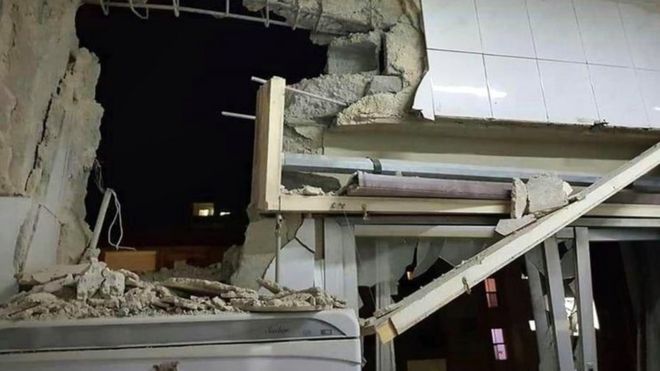 Israel says it has hit dozens of targets in Syria belonging to the government and allied Iranian forces.
Israel says it has hit dozens of targets in Syria belonging to the government and allied Iranian forces.
The Israeli military says the "wide-scale strikes" responded to rockets fired by an Iranian unit into Israel.
Syria says two civilians died and that Syrian air defences shot down most of the missiles over Damascus. Other reports say the death toll was higher.
Local reports said loud explosions were heard in the capital. Pictures on social media showed a number of fires.
On Tuesday morning, the Israeli military said it had intercepted four rockets fired from Syria towards northern Israel. It said the rockets did not hit the ground.

Israel has carried out hundreds of strikes in Syria since the civil war broke out in 2011.
It has been trying to thwart what it calls Iran's "military entrenchment" there and block shipments of Iranian weapons to Lebanon's Hezbollah movement.
But the latest operation was one of the broadest attacks to date, says the BBC's Barbara Plett Usher in Jerusalem.
A senior Israeli security official said the Israelis had decided on a powerful retaliatory strike to signal they were "changing the rules" - that even a small attack from Syria would trigger an extensive response, our correspondent reports.
What did Israel say?
Early on Wednesday, the Israel Defense Forces (IDF) tweeted that the strikes targeted positions of Iran's Quds Force and Syria's armed forces.
"During our strike of Iranian & Syrian terror targets, a Syrian air defence missile was fired despite clear warnings to refrain from such fire. As a result, a number of Syrian aerial defence batteries were destroyed," the IDF said.
The IDF also said it held "the Syrian regime responsible for the actions that take place in Syrian territory and warn them against allowing further attacks against Israel".
Iran's Quds Force is the external operations wing of the Islamic Revolution Guard Corps (IRGC).
Israel did not target the Russian-made advanced S-300 surface-to-air missile systems deployed near the positions of Russian troops, Israeli media report.
Russia, whose forces have helped turned the tide of Syria's civil war in favour of President Bashar al-Assad, condemned the Israeli strikes.
Moscow, whose air defence system covers most of Syria's airspace, generally does not interfere with Israeli strikes on Iranian forces and their affiliates.
The leaders of Russia and Israel enjoy good relations, and the Israeli military is said to warn the Russian military before it carries out any attacks.
What did Syria say?
Syria's state news agency Sana said that the country's "air defence confronted the heavy attack and intercepted the hostile missiles".
It said that Syria destroyed "most" of the Israeli missiles.
The news agency added that the strikes on Syrian territory were carried out from "Lebanese and Palestinian territories".
Israel has a number of times hit targets inside Syria from war planes in Lebanese airspace.
Danny Makki, a British-Syrian journalist based in Damascus, posted footage of what he said he believed were Israeli missiles hitting targets south of Damascus.
Syria said two civilians were killed in the Israeli strikes.
Meanwhile, a UK-based monitoring group, the Syrian Observatory for Human Rights (SOHR), said that 11 fighters, including seven foreigners, died.
The SOHR said that the Israeli missiles hit sites in and around Damascus in Kiswa, Saasaa, Mezzeh military airport, Jdaidat Artouz, Qudsaya and Sahnaya.
And what about Iran?
The Iranian authorities have so far made no public comment.
Upping military stakes
The message from Israel to Tehran is clear. Any attacks out of Syria will be met by a disproportionate response.
Now it is upping the military stakes.
But Iran is sending a message of its own, too.
Despite a long-running Israeli air campaign designed to constrain the Iranian build-up in Syria, Tehran is determined that this project will continue.
It is a close ally of the Assad regime in Damascus, and it sees Syrian territory both as a frontline across which to confront Israel and as an important link to its ally Hezbollah in Lebanon.
What is the Quds Force?
The Quds (Jerusalem) Force answers directly to Iran's Supreme Leader, Ayatollah Ali Khamanei.
It is led by Maj Gen Qasem Soleimani, who is believed to be more than a mere military commander.
Since the US-led overthrow of Saddam Hussein's regime in Iraq in 2003, the Quds Force has intensified its operations across the Middle East, providing training, funding and weapons to non-state groups allied to Tehran.
It has also developed forms of asymmetric warfare, such as swarm tactics, drone and cyber-attacks, that have allowed Iran to undermine its enemies' superiority in conventional weapons.
In April, US President Donald Trump designated the IRGC, including the Quds Force, a "foreign terrorist organisation" (FTO). It was the first time the US had named a part of another government as an FTO.

No comments:
Post a Comment